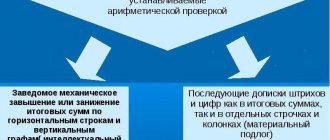ST 325 of the Criminal Code of the Russian Federation.
1. Theft, destruction, damage or concealment of official documents, stamps or seals, committed out of mercenary or other personal interest, is punishable by a fine in the amount of up to two hundred thousand rubles or in the amount of the wages or other income of the convicted person for a period of up to eighteen months, or by mandatory labor for a term of up to four hundred eighty hours, or correctional labor for a term of up to two years, or forced labor for a term of up to one year, or arrest for a term of up to four months, or imprisonment for a term of up to one year.
2. Theft of a citizen’s passport or other important personal document is punishable by a fine in the amount of up to eighty thousand rubles, or in the amount of the wages or other income of the convicted person for a period of up to six months, or by compulsory labor for a term of up to three hundred sixty hours, or by correctional labor for a term of up to one year, or arrest for up to three months.
3. Theft of excise stamps, special stamps or marks of conformity protected from counterfeiting is punishable by a fine of up to two hundred thousand rubles or in the amount of the wages or other income of the convicted person for a period of up to eighteen months, or by forced labor for a term of up to two years, or by imprisonment. for the same period.
Main
Art. 325 of the Criminal Code contains sanctions for those persons who decide to break the law and steal seals, stamps or other official documents. It is also necessary to point out that this article also establishes liability for those citizens who, out of their personal gain or interest, decided to steal someone else’s passport. Despite the fact that this document belongs to a certain person and serves as confirmation of his identity.
Sanctions for those persons who have committed a criminal act under Art. 325 of the Criminal Code are quite different. The punishment for committing this crime is determined by the judicial authority, based on the requirements of this article.
Tips and tricks
The theft of documents is fraught with consequences even for a law-abiding person. For example:
- living at the place of registration without a passport, according to Article 19.5 of the Code of Administrative Offenses of the Russian Federation, entails a fine;
- untimely restoration of accounting documents entails the imposition of a penalty on the amount of underpaid tax according to the requirements of Article 122 of the Tax Code of the Russian Federation;
- Driving a vehicle without documents will not only entail a fine based on the sanction of Article 12.3 of the Code of Administrative Offenses of the Russian Federation, but will also temporarily deprive you of your car, which will be taken to an impound lot, etc.
A timely contact with the police will save you from many possible problems, for example:
- a loan taken with a stolen passport can be challenged in court;
- the tax office will provide time to restore the information;
- The traffic police will not make any claims if someone, by presenting stolen papers, tries to evade criminal (administrative) liability;
- Rosreestr will suspend the suspicious transaction.
In most cases, stolen documents are restored in the same organizations that issued them. For example, if SNILS is stolen, it is faster and easier to restore it by contacting directly the branch of the pension fund where you received it. Some papers can be ordered at the MFC or through the government services website. Restoration rules change frequently, so in each specific situation you can check the current legislative norms with our specialists by phone or through the website.
Theft, destruction and damage
The social danger of this criminal act lies in the fact that the perpetrator, through his illegal actions, violates the established procedure for maintaining official documentation. After all, theft, as well as damage or destruction of seals and stamps does not provide an opportunity to continue carrying out official activities at the enterprise.
The perpetrator always acts out of self-interest or personal interest. It is possible that he wants to receive a ransom for the return of official documents, seals and stamps. Or, for example, return the stolen property in exchange for employment in a given institution.
Sanctions under part one
If the culprit has stolen, destroyed, damaged or hidden official documents, seals and stamps, then he may face the following punishment, prescribed in Part 1 of Art. 325 CC:
- a fine of up to 200 thousand or in the amount of the offender’s income for a period of up to one and a half years;
- compulsory work only for a period of up to 480 hours;
- corrective labor for up to 2 years;
- forced labor for a period of up to one year;
- arrest for a maximum of 4 months;
- the most severe is imprisonment for up to a year.
This list is exhaustive. Therefore, when assigning punishment for committing this crime, the court can choose only one of the sanctions prescribed in part one of Art. 325 CC.
Passport theft as a special case
Did something happen to you - your passport was stolen? Don’t despair, our specialists will tell you what actions to take and where to go.
Initially, you should contact law enforcement agencies and write a statement in any form, but be sure to indicate the following points:
- name of the body to which the application is submitted, full name and the position of manager;
- your data (full name, residential address, contact phone number, etc.);
- describe in detail the circumstances when the theft occurred;
- sign the application and indicate the date.
After this, you will be given a coupon confirming the registration of the application. When it is confirmed that your document has indeed been stolen, a criminal case will be initiated.
Note!
To protect yourself from possible negative actions of attackers, you need to file a police report as quickly as possible.
Next, contact the territorial department of the Ministry of Internal Affairs or the MFC to apply for a new passport. These bodies must be provided with a basic package of documents, which include:
- application form for issuing a passport;
- issued police ticket;
- statement of theft;
- a document confirming payment of the state duty;
- three photographs of the citizen (including an additional one for issuing a temporary certificate).
Additional papers may also be required:
- certificate of registration and divorce;
- birth certificate of children under 14 years of age;
- military ID for serving in the RF Armed Forces;
- certificate of your place of registration.
Note!
During the period while a new passport is being prepared (up to 2 months), you should be issued a temporary certificate.
The administrative regulations establish the following deadline for issuing a new passport:
- 10 days when writing an application at the applicant’s place of registration;
- 2 months if a set of documents with the application were submitted to another department.
If your passport was stolen abroad, immediately contact the Russian Consulate.
Personal documents
Part 2 art. 325 of the Criminal Code contains punishment for those citizens who decided to steal another person’s passport. Or other personal documents that belong to another person (for example, SNILS, marriage certificate, military ID).
A passport is an official document with which officials can accurately establish a person’s identity. Thus, its theft can cause the victim a lot of trouble and even problems with the law.
For this reason, when contacting the Federal Migration Service with an application to restore a lost passport, employees of this service often send citizens to the police in order to officially record this case of loss of an important document.
We write a statement to the police
If you discover that your documents are missing, you must contact the police with a written statement. The legislation of the Russian Federation does not contain strict requirements for treatment. It must contain the applicant’s data, a description of the crime, as well as evidence of its commission and the applicant’s signature.
Note!
You can report a crime either in writing or orally (Part 1 of Article 141 of the Criminal Procedure Code of the Russian Federation). In the second case, the police officer enters all information received from the victim into the protocol.
What awaits
What punishment can a person receive for stealing someone else’s passport or other personal document? According to part 2 of Art. 325 of the Criminal Code of the Russian Federation, sanctions here may be as follows:
- arrest (maximum 3 months);
- a fine of no more than 80 thousand or the amount of the offender’s income for a period of up to 6 months;
- compulsory work here can only be assigned for 360 hours;
- corrective labor for up to one year.
It should be noted right away that there is no prison sentence for a person who stole someone else’s personal documents. As practice shows, the guilty person is sent by the court to correctional labor or pays a fine in the amount specified in the sentence.
Other acts against law and order
Quite often, criminals, out of selfish interest or to commit a serious act, remove state registration plates from cars. Responsibility for the crime is prescribed in Article 325.1 of the Criminal Code of the Russian Federation. In practice there are quite a lot of such cases.
Most criminals are determined to receive a monetary reward in the future for returning the numbers. In certain cases, this action is performed in order to carry out a more serious crime.
For unlawful seizure of vehicle license plates, the offender may be imprisoned for a period of up to one year. This act also violates public order and security. After all, state license plates are recorded in the traffic police database.
Common types of crime
Today, there is a fairly widespread list of types of theft of forms. Criminal minds are finding more and more sophisticated ways to steal this or that paper.
But the main types can still be classified into two groups:
- Theft from the victim's personal vehicle or property.
- Theft directly from the hands of the victim.
Thieves may call and offer a reward for supposedly found forms. But it happens that after the bag is stolen, the thieves get rid of the papers, leaving only the wallet with the money, and respectable citizens, trying to help, report the find.
Subjects of the unlawful act
According to Article 325 of the Criminal Code, the actions of attackers are aimed at stealing and damaging, as well as concealing official documents, seals and stamps, a person’s passport, stealing excise stamps and marks of conformity. They will be the subjects of a crime. According to the first part of this article, their list is considered exhaustive:
- official documents, for example, the charter of the organization, power of attorney to manage the company, papers confirming the legality of the activity;
- seals and stamps (stamps, for documents).
This act will be completed at the moment when the culprit has carried out his illegal actions (stolen and damaged documents, seals for the purpose of personal interest, for personal gain).
According to the second part of the same article, the subject of the crime is the citizen’s passport or his other personal documents. These include: insurance certificate, tax identification number, military ID, driver's license. Because thanks to these documents, a certain citizen can exercise his rights and obligations without breaking the law. In turn, if these documents are stolen, a person is deprived of this opportunity.
The subjects of the crime under part three of this article are excise stamps and marks of conformity. The state protects them from counterfeiting. Marks of conformity are not considered documents. They are manufactured using special technology and applied to products that must be certified.
The Supreme Court plenum dealt with fake documents and license plates
Collage: Legal.Report The plenum of the Supreme Court of the Russian Federation discussed a draft resolution on cases of crimes encroaching on the established procedure for the circulation of official documents, state awards, excise stamps, as well as the procedure for registering vehicles. It turned out that judicial practice is very contradictory. And recent changes to criminal legislation have only added problems to law enforcement officers.
Lack of clarity and uniform approach
The speaker, Judge of the Supreme Court of the Russian Federation Tatyana Ermolaeva, recalled that in 2019 the legislator made significant changes to Article 327 of the Criminal Code of the Russian Federation, aimed at strengthening liability for forgery, production or circulation of counterfeit documents, state awards, stamps, seals or forms. In addition, Article 327.1 of the Criminal Code of the Russian Federation (production, sale of counterfeit excise stamps, special stamps or marks of conformity) has been repeatedly edited to make it stricter.
“These changes, not consistent in all respects, but contradictory in a number of ways, have brought a number of problems to judicial practice in criminal cases of such crimes,” complained the judge of the Supreme Court of the Russian Federation.
Ermolaeva provided general statistics. About 11-12 thousand people are convicted annually for committing crimes under Articles 324–327.1 of the Criminal Code of the Russian Federation. At the same time, criminal cases against a quarter of the accused were dismissed by the courts on non-exonerating grounds. Including the imposition of a court fine. The vast majority of persons (about 95%) are prosecuted under Article 327 of the Criminal Code.
“The study of judicial practice revealed a lack of clarity and a uniform approach among the courts on a number of issues regarding the application of this article,” said the judge of the Supreme Court.
First of all, according to Ermolaeva, difficulties are associated with the lack of legislative definitions of the concepts of “official document”, “official document granting rights or relieving oneself from obligations”, as well as “important personal document”. Despite the fact that for the purposes of criminal law relations it is difficult and sometimes incorrect to use the interpretation of documents contained in other branches of law. The Constitutional Court of the Russian Federation drew attention to this circumstance in its ruling dated May 19, 2009. Also, the legislator has not proposed clear distinctions between the criteria for different types of documents. And his approach to establishing crime and the punishability of unlawful acts with these documents is not entirely consistent.
Ermolaeva gave an example. Thus, according to Article 325 of the Criminal Code of the Russian Federation, liability for the theft of a citizen’s passport is less strict than for similar actions in relation to other official documents. And according to Article 327 of the Criminal Code of the Russian Federation, on the contrary, forgery of a passport and its use entail a more severe punishment than forgery of an official document granting rights or releasing one from obligations.
How to differentiate between documents
Ermolaeva gave a brief overview of the contents of the draft resolution, consisting of 19 points. The Supreme Court judge called the document “quite laconic,” but at the same time one that comprehensively includes an explanation of only those issues that concern the law enforcement officer.
Paragraphs 1–4 discuss the subject of crimes provided for in Articles 324, 325 and 327 of the Criminal Code of the Russian Federation. These points, according to Ermolaeva, contain the answer to the main question: what is meant by specific types of documents and how to distinguish them from each other.
In paragraph 1, taking into account the established judicial practice, it is explained that official documents granting rights or releasing from obligations in Article 324 of the Criminal Code of the Russian Federation and official documents in Part 1 of Article 325 of the Criminal Code of the Russian Federation mean such documents, including electronic ones, that are created and issued or are certified in the manner prescribed by law or other regulatory act by federal government bodies, government bodies of constituent entities of the Russian Federation, local government bodies or authorized organizations or persons. And the main purpose of these documents is that they certify legally significant facts.
Such documents fully include electronic documents. Recognition of the materiality of an electronic document as a type of document and its equivalence to a document on paper follows from the provisions of the federal laws on information and on electronic signatures.
“In the context of the development of digital technologies and the increasing use of electronic document management, unlawful actions in relation to electronic documents that are official can be qualified under Articles 324 and 325 of the Criminal Code of the Russian Federation, and their forgery - under Article 327 of the Criminal Code of the Russian Federation,” Ermolaeva explained.
Clause 2 of the draft is devoted to documents called “important personal” for the purposes of Part 2 of Article 325 of the Criminal Code of the Russian Federation (theft of a citizen’s passport or other important personal document). In addition to a citizen’s passport (including foreign, diplomatic or official), these include a military ID, driver’s license, pension certificate, certificate or diploma of education, vehicle registration certificate, vehicle passport and others. That is, documents belonging to a citizen that certify legally significant facts and give him a certain legal status, designed for their repeated or long-term use.
Corresponding explanations are contained in paragraph 6 of the draft. It states that theft, as well as the destruction, damage or concealment of a passport or other important personal document cannot be qualified under Part 1 of Article 325 of the Criminal Code of the Russian Federation (theft, destruction, damage or concealment of official documents, stamps or seals).
“This clarification reflects the principled position of the Presidium of the Supreme Court of the Russian Federation, developed over many years of practice,” Ermolaeva noted.
Fake or counterfeit?
Article 327 of the Criminal Code of the Russian Federation, as a result of amendments to it in 2019, established liability for the use of not only knowingly forged (Part 3), but also forged documents (Part 5). Paragraph 4 of the draft proposes a distinction between these crimes.
“It is not based on the difference in synonymous terms used by the legislator, but is based on the characteristics of documents protected by different parts of one article of the criminal law,” the speaker explained.
Thus, within the meaning of Part 5 of Article 327 of the Criminal Code of the Russian Federation, knowingly forged documents include any counterfeit documents certifying legally significant facts, with the exception of counterfeit citizen’s passports, identification cards or other official documents granting rights or releasing from obligations. For example, a forged civil contract, a diagnostic card of a vehicle, a decision of a general meeting of owners of premises in an apartment building.
Theft of state awards: the position of the Constitutional Court and the practice of the Supreme Court
Article 324 of the Criminal Code of the Russian Federation (purchase or sale of official documents and state awards) equally protects the circulation of state awards of the Russian Federation, the RSFSR, and the USSR. However, theft of official documents does not constitute a crime under this article. Responsibility for this crime is highlighted as an independent norm (Article 325 of the Criminal Code of the Russian Federation). Whereas responsibility for the theft of state awards is not an independent norm. In this regard, in judicial practice there is no unified approach to resolving the issue of whether theft is a way of illegally acquiring state awards and how exactly such actions should be qualified - under Article 324 of the Criminal Code of the Russian Federation or under the article of the Criminal Code of the Russian Federation providing for liability for theft of property. In paragraph 5, this problem of law enforcement is resolved as follows: the theft of state awards of the Russian Federation, the RSFSR and the USSR is one of the ways of their illegal acquisition and is qualified under Article 324 of the Criminal Code of the Russian Federation. If the theft of awards was associated with the use of violence, then such actions form a set of crimes provided for in Article 324 of the Criminal Code of the Russian Federation and the corresponding article of the Criminal Code of the Russian Federation on liability for a crime against life and health.
— This clarification is based on the legal position of the Constitutional Court of the Russian Federation that the public legal nature of a state award as an intangible benefit excludes the possibility of recognizing this benefit as an object of property rights. It is also confirmed by the practice of the RF Armed Forces on this issue,” Ermolaeva said.
What is recognized as fake license plates?
Paragraph 6 is devoted to Article 326 of the Criminal Code of the Russian Federation (falsification or destruction of a vehicle identification number). It is clarified that the use of a knowingly forged state registration plate includes, in particular, installation on a vehicle for the purpose of committing a crime or facilitating its commission or concealing a state registration plate produced in accordance with the established procedure, different from that included in the registration documents of this vehicle (for example, issued to another vehicle), driving for the same purposes a vehicle with such a state registration plate installed on it.
In this case, a counterfeit of a state registration plate is the production of such a sign in violation of the procedure established by the legislation on technical regulation or the introduction of changes into a sign manufactured in the established manner that distort the symbols applied to it (for example, by extrusion, mechanical removal of the symbol (symbols), erasure, touch-up) and allowing for a different interpretation of the sign.
Difficulties in applying Article 327
Paragraphs 8–14 of the draft are devoted to the application of Article 327 of the Criminal Code of the Russian Federation. In particular, paragraph 8 explains what exactly the forgery of a document consists of. Paragraph 10 proposes the interpretation “use of a forged (forged) document.” At the same time, the attention of the courts is drawn to the fact that the use by a person of his own original document that is invalid (for example, expired), or an original document belonging to another person, or the presentation of an original document similar to it instead of an appropriate document does not constitute a crime under Part 5 of Article 327 of the Criminal Code of the Russian Federation.
Paragraph 11 contains the answer to the question about the moment of termination of the use of a knowingly forged (forged) document. It is also explained here that if a deliberately forged (forged) official document presented by a person for the specified purpose was subsequently used to obtain rights or be relieved of obligations for a certain period (for example, during employment and during subsequent work in the organization), then the provisions provided for in Article 78 of the Criminal Code of the Russian Federation, the statute of limitations for criminal prosecution for such a crime should be calculated only from the moment of the actual cessation of the use of a forged (forged) official document, including as a result of the suppression of the act.
Qualification Questions
Ermolaeva noted that more dangerous crimes are committed using illegally acquired or counterfeit official documents, seals, stamps and forms - various frauds, smuggling, economic crimes. In this regard, courts often have questions related to the qualification of such acts, either according to the totality of such crimes, or only according to the article on a more serious crime, the method of which covers the illegal use of documents, stamps, seals, and forms.
In this regard, in paragraphs 12 and 13 of the draft, the attention of the courts is drawn to situations that require the qualification of acts as a set of crimes provided for both in various parts of Article 327 of the Criminal Code of the Russian Federation, and in other articles of the Criminal Code. It also reflects cases when the use of a deliberately forged document produced by another person to commit another crime is covered by the method of the crime committed (for example, fraud) and does not require an independent legal assessment under Part 3 or 5 of Article 327 of the Criminal Code of the Russian Federation.
Paragraph 14 contains clarifications regarding the qualification of acts under Part 4 of Article 327 of the Criminal Code of the Russian Federation and cases when acts can be recognized as committed with the aim of facilitating or concealing the commission of another crime. For example, when forgery and presentation of a false document are used for the purpose of illegally gaining access to a home or storage facility to commit theft.
Fake excise tax controversy
Paragraph 15 concerns the application of Article 327.1 of the Criminal Code of the Russian Federation on liability for the manufacture, sale of counterfeit excise stamps, special stamps or marks of conformity protected from counterfeiting, or their use. This item was proposed for consideration by the plenum with an option. In particular, the members of the plenum had to decide whether persons who themselves did not label alcohol and tobacco with counterfeit brands, but who purchased such products for the purpose of marketing, knowing for certain that those placed on them, could be held liable under Part 4 or 6 of Article 327.1 of the Criminal Code of the Russian Federation. fake stamps, and then sold it. At the same time, the speaker emphasized, it should be borne in mind that these persons did not commit actions that are described in the disposition of the article as the use of counterfeit stamps for marking.
— The opinions of the courts on this issue were significantly divided. This issue requires discussion,” Ermolaeva stated.
As a result, the draft resolution was sent to the editorial committee for revision.
A comment
So, every citizen of our country should know that there is liability for the theft, damage and concealment of official documentation, seals, stamps, citizen’s passports, theft of excise stamps and marks of conformity that are applied to certain types of products. The punishment for the crime is stated in Art. 325 of the Criminal Code of the Russian Federation. I can only agree with her comments. This act is considered completed only at the moment when the perpetrator commits his illegal actions.
The subject of a crime can only be a sane person who is already sixteen years old. If the perpetrator has not reached the specified age, then he cannot be held accountable for his actions.
Important
So, when committing this crime, the perpetrator must be fully aware of the illegality of his actions. In addition, the criminal here can be any person and even an employee of the organization from which the documents or seal were stolen. Most often this is what happens. Moreover, the perpetrator always acts only out of selfish goals and personal interest. For example, an employee needed to steal documents in order to help his relatives. The latter realized that he was acting illegally, but nevertheless decided to do it. There are quite a lot of such cases. Some people commit this act out of personal revenge on someone. In other words, the perpetrator carries out illegal actions intentionally.
Characteristic
Many citizens of our country do not even know that there is any liability for the theft of a passport or other personal documents. Nevertheless, there is a punishment for this act; it is fixed in Art. 325 CC. The commentary to it once again confirms this fact. Here it must also be said that for the theft of excise taxes and conformity stamps protected from forgery, the punishment is more severe than for theft and damage to official documents and stamps. After all, for committing such an act you can even lose your freedom for up to two years.
It should also be noted that Article 325 of the Criminal Code is divided into three parts, each of which has its own qualifying characteristics and sanctions.
Bottom line
All law-abiding citizens of Russia should have at least a little understanding of the norms of criminal law. After all, this can prevent them from committing illegal actions. As practice shows, employees of the same institution in which the crime was committed are usually prosecuted for the theft and damage of documents. Interestingly, seals are often stolen by people who work with them for personal gain. For example, one employee took a stamp from another and did not return it, and the latter was fired due to the fact that he was dishonest in his duties.
Citizens are rarely punished for theft of personal documents. Because it is not always possible to prove the fact that one citizen took a passport or TIN from another. Moreover, a person could simply lose his documents through negligence.
The situation is a little more complicated with excise stamps and marks of product conformity, because they are protected from counterfeiting. However, it often happens that they are kidnapped by the perpetrators for a specific purpose - to attach them to illegally produced products. Therefore, the sanctions for carrying out such an act are more stringent.
Article of the Criminal Code of the Russian Federation on theft of documents
Concealment, destruction, theft, theft of documents is an article of the Criminal Code of the Russian Federation - Article 325 of the Criminal Code of the Russian Federation. This action is considered illegal, which means it entails responsibility and punishment. It does not matter under what circumstances the crime was committed, punishment occurs even if the criminal hid the papers for some personal purpose.
The first part of the article provides data on the theft of seals, stamps and other official documents.
Official documents are papers that confirm any facts and/or events that have legal significance. In addition, such papers may provide rights or impose obligations. Official documents have a prescribed form and details. The latter may be on stamps and seals, so their theft also carries criminal liability.
For example, if a seal with its details was stolen from a large organization, the thief may face punishment up to one year in prison. It all depends on the circumstances in which the crime was committed and the goals of the criminal. Indeed, in one case, a person could inadvertently confuse the seals and take someone else’s with him, and in another, he could purposefully steal it in order to make transactions on behalf of the organization.
The second part of the article talks about the theft of a citizen’s passport or other personal documents.
Also read: Plenum on theft, robbery and robbery
Responsibility arises for the theft of a passport, not only a civil one, but also a diplomatic, service or sailor’s passport, as well as papers that perform the function of a passport. In addition, liability also arises for the theft of a driver’s license, work book, pension certificate, etc.
Did you know that if your passport is stolen, you may face a fine? It seems that this is some kind of absurdity, but it is really so. At the end of the article, circumstances due to which such a situation may occur are given.
The third part examines the theft by any means of excise and special stamps, marks of conformity and seals.
In case of their theft, criminal liability arises, which may entail punishment in the form of a fine of up to two hundred thousand rubles.
If the criminal himself admits to the theft and returns the stamps to their owner, then punishment can be avoided. Read more about this further.







